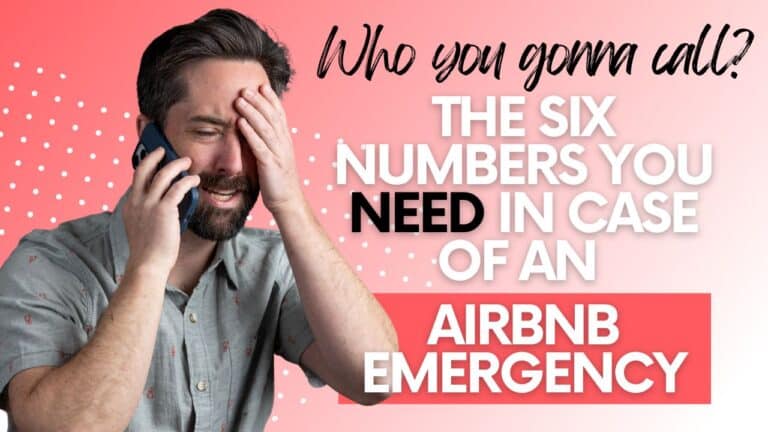Airbnb Regulations: The Rules of Airbnb Hosting
This is perhaps one of the more boring subject matters and just researching the general short-term rules and regulations tested my tolerance for caffeine in a way I’m unaccustomed to. However, it’s super important to have a correct understanding of the policies for vacation rental sites you are using and each city, state, and country your vacation rental is located as well. I found many of these policies common sense like non-discrimination, but some of them caught me off guard like tenant rights and city permits.
There are a lot of rules and regulations that Airbnb hosts need to follow, but don’t worry–they’re all pretty straightforward! We’ll go over the basic stuff first like a city’s laws. Next up: tenant rights for vacation renters who stay at your place without being listed as an owner/host themselves (a common occurrence) then Airbnb’s non-discrimination policy. Then there are some other obligations you’re maintaining compliance with by keeping vacation rental property clean & safe during each visit; making sure guests know about any safety hazards before arrival so they can take care if necessary themselves
Legal Requirements
In this section, we will discuss the legal requirements that all Airbnb hosts must meet.
Regulations enforced by local governments
The first thing to be aware of is that each local jurisdiction has its own set of regulations regarding short-term rentals. This means that, before you list your property on Airbnb, you’ll need to check with your city’s regulations section or county to see what the rules are. Some jurisdictions have very strict rules about vacation rentals, but many cities are much more relaxed. There are a number of new laws and restrictions on short-term rentals in cities and towns limiting the number of listings, the type of rentals, and where they can be located. Cities like San Francisco were early to adopt a permit process where you have to apply for an annual permit to have a short-term rental.
It’s also important to note that, even if many cities don’t have regulations in place, short-term rentals may still be subject to other rules and restrictions that long-term rentals are not. For example, your apartment building or homeowners association might have rules about short-term rentals. So, be sure to check with all relevant parties before you list your property on Airbnb.
Questions to ask yourself:
-Do I own my property or rent?
-Do I have a condo or homeowners association (HOA) and do they have restrictions?
-Are there any town or city restrictions, or zoning laws?
-Do I need a business license?
-Are there specific rules about Airbnb rentals or safety regulations?What are occupancy taxes and do I manage them?
How does the figure of speech go? The only certain things in life are death and taxes. When you rent out your property on Airbnb or any other vacation rental platforms including VRBO and Booking.com, you will be required to remit local occupancy tax. The specific tax laws vary depending on your country, state, and county so it’s important to do a little research to figure out what the tax policy is. In many locations, Airbnb collects and remits occupancy taxes on your behalf as an Airbnb host, which is my case in North Carolina, but if I were taking direct bookings for short-term rental guests I would have to pay those city taxes directly.
Rented or leased residential property
If you’re renting out a property that you don’t own, there’s an additional consideration to keep in mind. You will need to get your landlord’s permission before you list the property on Airbnb. Be sure to get this in writing, as it will protect both you and your landlord in case of any issues. This is called rental arbitrage
What is rental arbitrage?
Rental arbitrage is the process of renting a property and then subletting it for a higher price. This can be a great way to make extra money, and start a short term rental business, but it’s important to be aware of the risks involved. First of all, you’ll need to make sure that your lease allows for subletting. Secondly, you’ll need to be careful that you don’t end up losing money if the rental market changes or your landlord drastically raises your rent.
Airbnb’s Regulations
In addition to the regulations set by local government, Airbnb also has its own set of rules that hosts must follow. These rules are designed to keep both guests and hosts safe and to ensure that everyone has a positive experience on the platform.
Some of the most important Airbnb host obligations include the following:
– Hosts and Airbnb guests must be at least 18 years old.
– All reservations must be made through the Airbnb platform. Airbnb hosts are not allowed to accept reservations outside of the platform.
– Hosts must provide accurate information about their property, including photos, descriptions, and amenities.
– Hosts must comply with all local laws and regulations, including those related to zoning, occupancy limits, and noise levels.
– Hosts must maintain their property in a clean and safe condition.
– Pets are not allowed on the property unless specifically stated in the listing.
– Hosts must provide guests with all of the information they need to have a pleasant stay, including check-in and check-out times, house rules, contact information, and directions to the property.
Responsive Behavior:
To ensure that all guests have a positive experience, Airbnb requires hosts to be responsive to messages within 24 hours. This means that, if a guest contacts you with a question or concern, you will need to reply within 24 hours. If you fail to do so, your account may be suspended.
Accept Guest Requests:
You don’t necessarily need to accept all reservations, and in fact, you shouldn’t for several reasons but you want to be confident you aren’t violating Airbnb’s nondiscrimination policy when you decline a guest’s booking request.
Reasons you can decline a reservation request
-A potential guest makes you feel unsafe
-A guest is making a request that violates your house rules
-A guest sends an inappropriate message
-A guest has bad reviews that show a pattern of behavior that violates your house rules and/or Airbnb policies.
Avoid Cancellations:
Canceling a reservation can be a major inconvenience for guests, so Airbnb requires hosts to avoid cancellations whenever possible. Airbnb will levy a fee against hosts who cancel reservations, and repeated cancellations can result in the suspension of your account.
High Ratings:
To ensure that all guests have a positive experience, Airbnb requires hosts to maintain high ratings. Hosts who consistently receive low ratings may be removed from the platform.
Provide Essential Amenities:
As a host, you are responsible for providing all of the essential amenities that your guests will need during their stay. This includes things like clean sheets and towels, toiletries, and basic kitchen supplies. Here is a list of essential amenities that all hosts must provide:
– Clean sheets
-One towel per guest
– Toilet paper
-Soap for body and hands
Non-Discrimination Policies
Airbnb has a strict non-discrimination policy which you should take some time and read. Read it multiple times and do yourself a favor and apply it to all areas of your business and life. This means that hosts cannot refuse to rent to guests based on their race, religion, national origin, disability, sexual orientation, or gender identity. If you are found to be discriminating against guests, your account will be suspended.
Here is a quick overview of the non-discrimination policy:
Airbnb is committed to diversity and inclusion. They believe that by encouraging hosts to welcome guests from all backgrounds, we can create a community that is stronger, more resilient, and more vibrant. Airbnb’s nondiscrimination policy prohibits discrimination in housing based on race, ethnicity, national origin, color, religion, gender identity or expression, sexual orientation, disability, age, or any other characteristic protected by local law.
Hosts are required to comply with all applicable laws and regulations, including those related to discrimination. If you believe that a host has violated this policy, please report it to Airbnb.
One way Airbnb tries to limit discrimination from hosts is to hide guests’ profile photos and not allow guests to share photographs before completing a booking. If a guest feels like you as the host violates Airbnb’s non-discrimination policy you will have your account suspended and have to work with the trust and safety department to resolve any issues.
Disability Access
Hosts are not allowed to discriminate against guests with disabilities and must make reasonable accommodations to ensure that their listing is accessible to guests with disabilities. This includes, but is not limited to, providing clear and accurate descriptions of the property and its amenities, ensuring that there are no physical barriers preventing guests with disabilities from accessing the property, and providing any necessary equipment or assistance required for guests with disabilities to use the property.
Hosts are not allowed to charge guests with disabilities higher prices or fees than other guests and must make reasonable efforts to accommodate requests for special assistance from guests with disabilities.
Service animals are the most common instance where a guest will ask about bringing their service dog to your listing so prepare your response ahead of time.
Age and gender restrictions
Airbnb does not allow hosts to discriminate against guests based on their age. This means that hosts cannot refuse to rent to guests under a certain age, charge them higher prices or fees, or impose any other restrictions or conditions based on their age.
However, hosts are allowed to set minimum age requirements for guests in certain jurisdictions like neighborhoods that require residents to be over 55 years old.
One of my Airbnbs is on the Outer Banks, NC and I often wish I could set an age minimum. My logic is why can a car rental company say someone needs to be 25 to rent an $18,000 Chevy Spark but a million-dollar beach house is okay for a group of 18-year-olds?
Airbnb does not allow hosts to discriminate against guests based on their gender. This means that hosts cannot refuse to rent to guests based on their gender identity or expression, charge them higher prices or fees, or impose any other restrictions or conditions based on their gender.
However, hosts are allowed to allow guests of the same gender as theirs if they share living quarters such as a bathroom or bedroom.
In conclusion
The most difficult part of hosting for many people seems to be getting started. It can feel daunting to reach out to your accountant and research local laws, but it’s important to remember that you’re setting up a proper business here. Once you have the foundation in place, managing your vacation rental will be much easier. Have you had any questions along the way? We’re happy to help!









